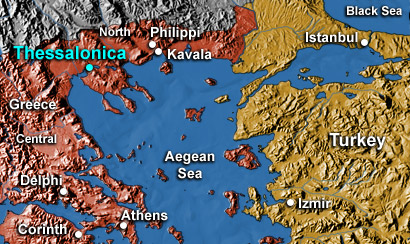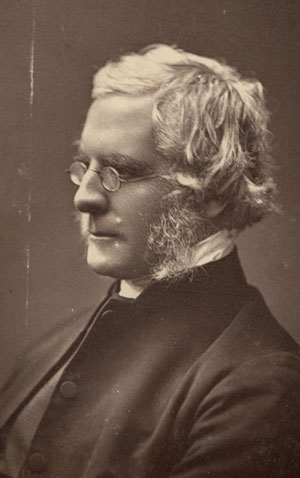The destiny of the impenitent and unbelieving is existence forever in conscious torment, but that of the believer is everlasting joy and bliss (Matthew 25:41-46; 2 Thessalonians 1:7-10).This analysis will be the context for my own response to Rob Bell's Love Wins. Check back for the intro, an exploration of the statement, and the first part of my assessment of its biblical backing. What follows are my reflections on the last two passages cited in support of the above article.
- Matthew 25:41-46
(41) Then he will say to those on his left, ‘Depart from me, you who are cursed, into the eternal fire prepared for the devil and his angels. (42) For I was hungry and you gave me nothing to eat, I was thirsty and you gave me nothing to drink, (43) I was a stranger and you did not invite me in, I needed clothes and you did not clothe me, I was sick and in prison and you did not look after me.’ (44) They also will answer, ‘Lord, when did we see you hungry or thirsty or a stranger or needing clothes or sick or in prison, and did not help you?’ (45) He will reply, ‘Truly I tell you, whatever you did not do for one of the least of these, you did not do for me.’ (46) Then they will go away to eternal punishment, but the righteous to eternal life.
 This is from the end of Jesus' famous parable of the sheep and the goats, in which Jesus tells the story of a King who divides the nations up and then tells those on the right: "Come, you who are blessed by my Father; take your inheritance, the kingdom prepared for you since the creation of the world." The parable is referenced in the third article of the C&MA statement of faith to support the affirmation that Jesus "will come again to establish His kingdom of righteousness and peace" (referencing his promise at the ascension as well). In the fifth article the concern appears to be a bit more for the people on Jesus' left (since only verses 41-46 are referenced).
This is from the end of Jesus' famous parable of the sheep and the goats, in which Jesus tells the story of a King who divides the nations up and then tells those on the right: "Come, you who are blessed by my Father; take your inheritance, the kingdom prepared for you since the creation of the world." The parable is referenced in the third article of the C&MA statement of faith to support the affirmation that Jesus "will come again to establish His kingdom of righteousness and peace" (referencing his promise at the ascension as well). In the fifth article the concern appears to be a bit more for the people on Jesus' left (since only verses 41-46 are referenced).Narrowing in on the specific topic at hand, however, in the verses cited above we are told that those who did not help the hungry, thirsty, naked or imprisoned would be the ones to "go away to eternal punishment". This in support of the statement that the "destiny of the impenitent and unbelieving is existence forever in conscious torment." Do the verses support this?
If we expand our search of NT usages to include other forms of the word we also find the religious leaders trying to figure out how to "punish" the early Christians in Acts 4:21, and we find the Lord keeping the "unrighteous under punishment until the day of judgment" in 2 Peter 2:9 (NASB). In the latter reference it seems that the punishment ends rather than begins at judgment, but I am not sure how much to make of it. The context is a reminder that if God sent sinning angels to hell (ταρταρόω, the underworld), sent the ungodly ancients a flood, and burned Sodom and Gomorrah to ashes, then the Lord knows how to rescue the godly and punish the false prophets. Reference is also made to the rescues of Noah's family and of Lot, who, curiously enough, was "tormented" during his life in Sodom by all the lawless deeds around him. All this 2 Peter uses to encourage the readers that they can trust God to preserve them in their trials and to administer justice in time.
- 2 Thessalonians 1:7-10
(7) This will happen when the Lord Jesus is revealed from heaven in blazing fire with his powerful angels. (8) He will punish those who do not know God and do not obey the gospel of our Lord Jesus. (9) They will be punished with everlasting destruction and shut out from the presence of the Lord and from the glory of his might (10) on the day he comes to be glorified in his holy people and to be marveled at among all those who have believed. This includes you, because you believed our testimony to you.This passage does double duty for the C&MA statement as well. Article ten talks about "a bodily resurrection of the just and of the unjust" which is "for the latter a resurrection unto judgment," and it references these verses again.
 The verses cited come in the context of Paul's encouragement of a church in Thessalonica which is suffering at the hands of its "own countrymen" what churches in Judea were suffering from the Jews (1 Thess. 2:14). Acts 17 tells us that Thessalonica is the place Paul and Silas had to escape from because their initial preaching started riots and got church members thrown in prison. Paul did not leave for his own safety but for the sake of that church. They were safer if prominent members of the Christian mission were not in their midst throwing the city "into turmoil" (Acts 17:8). Paul later sends Timothy to check how the Thessalonian church is doing under persecution, and 2 Thessalonians is Paul expressing both his pleasure at the news of their resolve and his encouragement that they not lose heart.
The verses cited come in the context of Paul's encouragement of a church in Thessalonica which is suffering at the hands of its "own countrymen" what churches in Judea were suffering from the Jews (1 Thess. 2:14). Acts 17 tells us that Thessalonica is the place Paul and Silas had to escape from because their initial preaching started riots and got church members thrown in prison. Paul did not leave for his own safety but for the sake of that church. They were safer if prominent members of the Christian mission were not in their midst throwing the city "into turmoil" (Acts 17:8). Paul later sends Timothy to check how the Thessalonian church is doing under persecution, and 2 Thessalonians is Paul expressing both his pleasure at the news of their resolve and his encouragement that they not lose heart.In verse 7 we see that God will pay back the oppressors and give relief to the oppressed "when the Lord Jesus is revealed from heaven in blazing fire with his powerful angels" (v. 7). The literal translation of verse 6 indicates that their "pay-back" is commensurate with the affliction that they have been inflicting. The image provided calls to mind a second coming with judgement and wrath for that which is opposed to Christ's purposes for creation.
Interesting that Jesus is "revealed (ἀποκάλυψις) from heaven" in verse 7 and "comes to be glorified in" people in verse 10. This doesn't necessarily contradict the images of descent from the sky that take place in other passages, but the image is, here at least, more a matter of revelation, apocalypse, or perhaps realization. The NICNT notes that the retribution that the verses talk about is not necessarily subsequent to but part of the revelation of Jesus Christ. It also notes that where other apocalyptic literature would have gone on in gory detail, this account seems more reticent, preferring instead to talk about this apocalypse coming "from heaven", "with the angels", and "in blazing fire" (NICNT 1991, 201). Some hold that the 'blazing fire' describes the punishment, but this commentary reminds us that it more directly describes the revealing of the Lord Jesus. These may not be mutually exclusive, mind you, but this verse is not giving us a literal description of hell. Fire is not uncommonly a "symbol of the divine presence" (202).


- What shall we say then?
- What else can we picture in terms of "destiny" when the one passage has Jesus tell those on his left to "depart" for "eternal punishment"? Whenever this takes place, that seems pretty binding. In the other passage, I think it entirely possible to read it in terms of a day of reckoning amongst other possible days of reckoning during our time on earth, but even then there doesn't seem in these verses to be any option left open for repentance, as Bell has been reputed to suggest. We'll have to deal with that later. Suffice it for now to say that the C&MA has indeed pointed to passages which seems to support its rendering of things in terms of a sometime-finalized 'destiny'.
- However, when we see that the punishment and the destruction are eternal, I think based on these two passages we have to leave open the possibility that, while it could involve (a) an infinite duration of self-aware suffering, it could also refer to (b) an eternally binding decision in which the person is separated from the life of God and either (b.i) destroyed or (b.ii) punished in some eternal "moment" with no duration of the sort we'd be familiar with. I'm not saying I know what interpretation to land on (if any), but I am saying that these particular verses alone do not themselves necessitate a belief in "existence forever in conscious torment".




